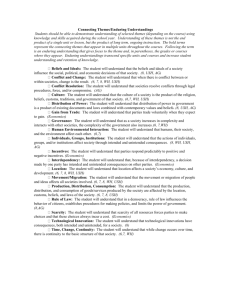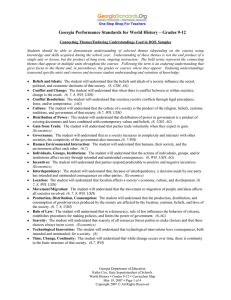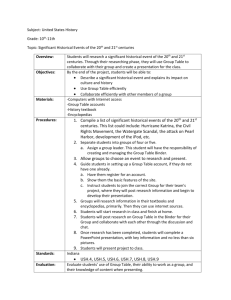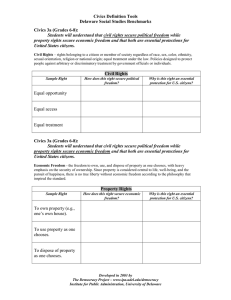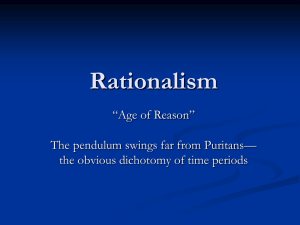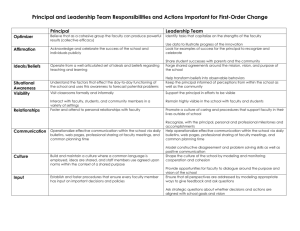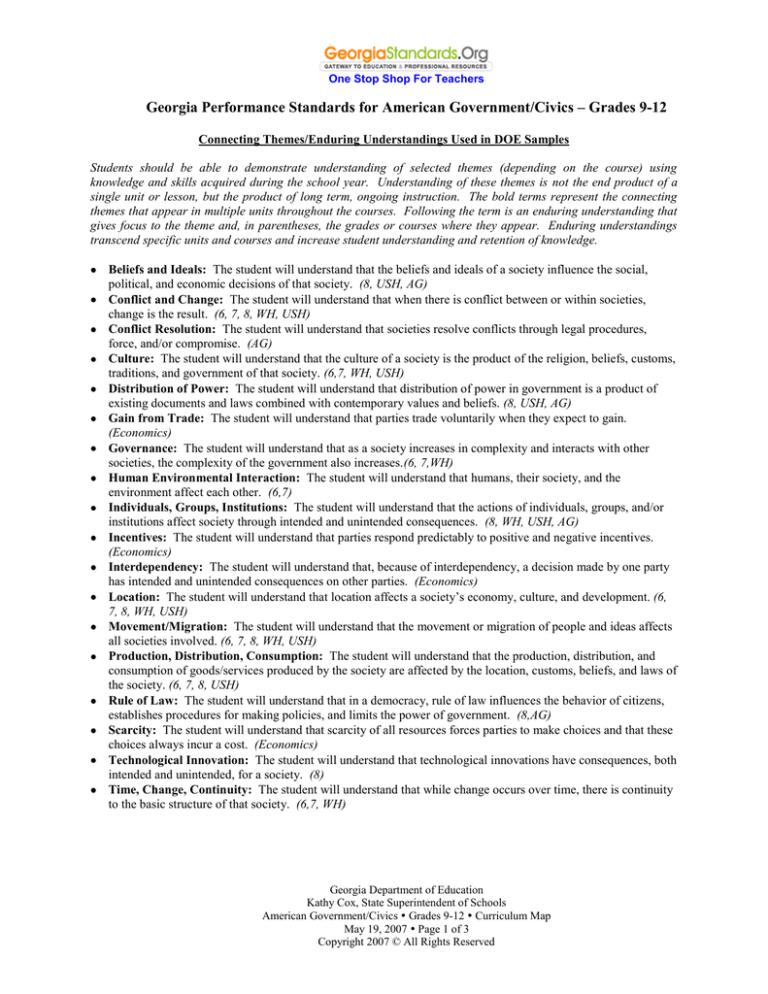
One Stop Shop For Teachers
Georgia Performance Standards for American Government/Civics – Grades 9-12
Connecting Themes/Enduring Understandings Used in DOE Samples
Students should be able to demonstrate understanding of selected themes (depending on the course) using
knowledge and skills acquired during the school year. Understanding of these themes is not the end product of a
single unit or lesson, but the product of long term, ongoing instruction. The bold terms represent the connecting
themes that appear in multiple units throughout the courses. Following the term is an enduring understanding that
gives focus to the theme and, in parentheses, the grades or courses where they appear. Enduring understandings
transcend specific units and courses and increase student understanding and retention of knowledge.
Beliefs and Ideals: The student will understand that the beliefs and ideals of a society influence the social,
political, and economic decisions of that society. (8, USH, AG)
Conflict and Change: The student will understand that when there is conflict between or within societies,
change is the result. (6, 7, 8, WH, USH)
Conflict Resolution: The student will understand that societies resolve conflicts through legal procedures,
force, and/or compromise. (AG)
Culture: The student will understand that the culture of a society is the product of the religion, beliefs, customs,
traditions, and government of that society. (6,7, WH, USH)
Distribution of Power: The student will understand that distribution of power in government is a product of
existing documents and laws combined with contemporary values and beliefs. (8, USH, AG)
Gain from Trade: The student will understand that parties trade voluntarily when they expect to gain.
(Economics)
Governance: The student will understand that as a society increases in complexity and interacts with other
societies, the complexity of the government also increases.(6, 7,WH)
Human Environmental Interaction: The student will understand that humans, their society, and the
environment affect each other. (6,7)
Individuals, Groups, Institutions: The student will understand that the actions of individuals, groups, and/or
institutions affect society through intended and unintended consequences. (8, WH, USH, AG)
Incentives: The student will understand that parties respond predictably to positive and negative incentives.
(Economics)
Interdependency: The student will understand that, because of interdependency, a decision made by one party
has intended and unintended consequences on other parties. (Economics)
Location: The student will understand that location affects a society’s economy, culture, and development. (6,
7, 8, WH, USH)
Movement/Migration: The student will understand that the movement or migration of people and ideas affects
all societies involved. (6, 7, 8, WH, USH)
Production, Distribution, Consumption: The student will understand that the production, distribution, and
consumption of goods/services produced by the society are affected by the location, customs, beliefs, and laws of
the society. (6, 7, 8, USH)
Rule of Law: The student will understand that in a democracy, rule of law influences the behavior of citizens,
establishes procedures for making policies, and limits the power of government. (8,AG)
Scarcity: The student will understand that scarcity of all resources forces parties to make choices and that these
choices always incur a cost. (Economics)
Technological Innovation: The student will understand that technological innovations have consequences, both
intended and unintended, for a society. (8)
Time, Change, Continuity: The student will understand that while change occurs over time, there is continuity
to the basic structure of that society. (6,7, WH)
Georgia Department of Education
Kathy Cox, State Superintendent of Schools
American Government/Civics Grades 9-12 Curriculum Map
May 19, 2007 Page 1 of 3
Copyright 2007 © All Rights Reserved
One Stop Shop For Educators
The following instructional plan is part of a GaDOE collection of Unit Frameworks, Performance Tasks, examples of Student Work, and Teacher Commentary. Many more
GaDOE approved instructional plans are available by using the Search Standards feature located on GeorgiaStandards.Org.
Georgia Performance Standards for American Government/Civics – Grades 9-12
Standards: The focus of this
important first unit is on the concepts
and enduing understandings rather than
specific standards
Unit One focus:
Connecting themes in
American
Government/Civics
In this unit students will be
introduced to the unit
connection themes of
Beliefs & Ideals
Conflict Resolution
Distribution of Power
Individuals, Groups, &
Institutions
Rule of Law
These themes will provide the
framework for the study of
American Government for the
rest of the year.
Standards: 6b, c, d, e; 16a, c, d; 21;
22
Standards: 4a; 9; 10; 11; 15;
17a
Standards: 4a; 12; 13; 14; 17a;
20
Unit Two focus:
Unit Three focus:
Rules were made to be
broken…or at least
interpreted
Unit Four focus:
The Executive:
DISTRIBUTION OF
POWER
CONFLICT RESOLUTION
Your Day in
Court is Coming!
BELIEFS & IDEALS
Equal treatment under the law (6e)
Judicial philosophies (16d)
Types of defenses used (21d)
Protections in the system (22a,b)
CONFLICT RESOLUTION
Judicial Process (22a)
Civil liberties and civil rights in conflict
(6d)
Sentencing decisions (22d)
INDIVIDUALS, GROUPS &
INSTITUTIONS
Nature/causes of crimes (21a)
Effects of crime on victims (21b)
RULE OF LAW
Key documents establishing the judicial
process and explaining civil rights and
civil liberties (6b,c; 16a,c; 22a)
Types of crimes as described by
statutory law (21c)
Criminal and Civil Law (22c)
Roles in congress (9)
Legislative process (10a)
INDIVIDUALS, GROUPS &
INSTITUTIONS
Leaders in Congress (9; 10b)
Function of lobbyists & interest
groups (11a,c)
Role of Executive Agencies
(15a,b)
Dream Job or Nightmare?
Impeachment process (14)
Various roles of the president (12;
20)
INDIVIDUALS, GROUPS &
INSTITUTIONS
Roles of the president (12)
Characteristics common to past
presidents (13b)
Decisions of Clinton/Johnson
(14b)
RULE OF LAW
Structure/powers of legislature
(4a; 9; 17a)
Legislative Process (10a)
Laws that govern lobbyists (11b)
Bureaucratic decisions that create
rules and regulations (15a)
Functions of the cabinet (15b)
Georgia Department of Education
Kathy Cox, State Superintendent of Schools
American Government/Civics Grades 9-12 Curriculum Map
May 19, 2007 Page 2 of 3
Copyright 2007 © All Rights Reserved
RULE OF LAW
Structure/powers of Executive
(4a; 17a)
Requirements for the president
(13a)
Impeachment process (14)
One Stop Shop For Teachers
Georgia Performance Standards for American Government/Civics – Grades 9-12
Standards: 5; 17b-e; 18
Standards: 1; 2; 3; 4b; 16b;
19
Standards: SSCG 6a; 7; 8
Unit Five focus:
America’s Federal System
Unit Six focus:
Why this form of
government?
(How did we get here?)
Unit Seven focus:
Individual, Groups, and
Choices
DISTRIBUTION OF
POWER
BELIEFS & IDEALS
BELIEFS & IDEALS
Examined as it applies to:
Relationship of state/national,
state/local (5a, c; 17d)
Conflicts among National,
State, and Local levels of
Government (5e)
The structure of state/local
government (17b,c)
Powers/services of each level
(5b,c,d; 18a,c)
RULE OF LAW
Examined as it applies to:
Types of powers (5b,d)
The United State Constitution
(5f)
Direct democracy
The Georgia Constitution (17,
18a)
Sources of revenue (18b)
Early philosophies of
government and social
contracts (1;2)
Ratification debate (3a)
Fundamental principles (3c)
DISTRIBUTION OF
POWER
Fundamental principles (3c;
4b)
Role of the Judiciary (16b)
Other Government structures
across the globe (19)
RULE OF LAW
Key documents influencing
American Democracy (1; 2b)
Early philosophies of
Democratic government
(1b;2a)
Purpose of government (3b)
Fundamental principles (3c)
Free speech issues
Participation in a democratic
society in multiple forms (7)
Media coverage of elections
(8d)
Suffrage expansion (8d)
INDIVIDUAL, GROUPS &
INSTITUTIONS
Role of parties (8a)
RULE OF LAW
1st Amendment protections
(6a)
Election process (8b)
Limits on election spending
(8c)
Suffrage expansion (8d)
Georgia Department of Education
Kathy Cox, State Superintendent of Schools
American Government/Civics Grades 9-12 Curriculum Map
May 19, 2007 Page 3 of 3
Copyright 2007 © All Rights Reserved

